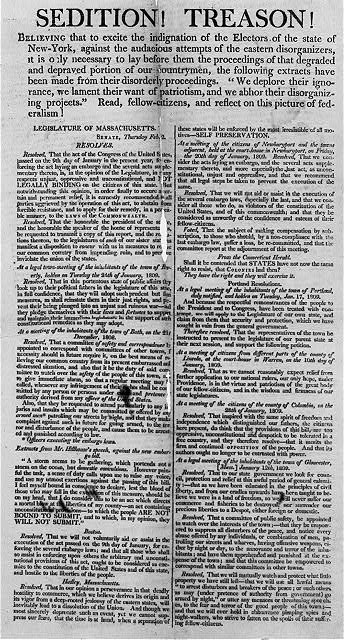Introduction
The Kentucky and Virginia legislatures transmitted to other state legislatures their respective resolutions declaring the Alien and Sedition Acts unconstitutional and calling for state interposition to bring about their repeal (Virginia Resolutions). The response was mixed. Several state legislatures declined to respond altogether; the Tennessee and Georgia legislatures issued resolutions siding with Virginia and Kentucky in opposing the Alien and Sedition Acts but without expressing support for the doctrine of state interposition; and a number of state legislatures approved resolutions expressing strong disagreement with the claims and doctrines advanced in the Virginia and Kentucky Resolutions.
The Massachusetts Legislature rejected entirely Virginia’s proposition that state legislatures could pass judgment on the constitutionality of federal laws. That was the role of the federal judiciary. The role of the state legislatures was restricted to proposing amendments to the Constitution.
—John Dinan
The legislature of Massachusetts, having taken into serious consideration the resolutions of the state of Virginia, passed the 21st day of December last, and communicated by his excellency the governor, relative to certain supposed infractions of the Constitution of the United States, by the government thereof; and being convinced that the federal Constitution is calculated to promote the happiness, prosperity, and safety of the people of these United States, and to maintain that union of the several states so essential to the welfare of the whole; and being bound by solemn oath to support and defend that Constitution, feel it unnecessary to make any professions of their attachment to it, or of their firm determination to support it against every aggression, foreign or domestic.
But they deem it their duty solemnly to declare that, while they hold sacred the principle that consent of the people is the only pure source of just and legitimate power, they cannot admit the right of the state legislatures to denounce the administration of that government to which the people themselves, by a solemn compact, have exclusively committed their national concerns.1 That, although a liberal and enlightened vigilance among the people is always to be cherished, yet an unreasonable jealousy of the men of their choice; and a recurrence to measures of extremity upon groundless or trivial pretexts, have a strong tendency to destroy all national liberty at home, and to deprive the United States of the most essential advantages in relations abroad. That this legislature are persuaded that the decision of all cases in law and equity arising under the Constitution of the United States, and the construction of all laws made in pursuance thereof, are exclusively vested by the people in the judicial courts of the United States.
That the people, in that solemn compact which is declared to be the supreme law of the land, have not constituted the state legislatures the judges of the acts or measures of the federal government, but have confided to them the power of proposing such amendments of the Constitution as shall appear to them necessary to the interests, or conformable to the wishes, of the people whom they represent.
That, by this construction of the Constitution, an amicable and dispassionate remedy is pointed out for any evil which experience may prove to exist, and the peace and prosperity of the United States may be preserved without interruption.
But, should the respectable state of Virginia persist in the assumption of the right to declare the acts of the national government unconstitutional, and should she oppose successfully her force and will to those of the nation, the Constitution would be reduced to a mere cipher, to the form and pageantry of authority, without the energy of power; every act [of] the federal government which thwarted the views or checked the ambitious projects of a particular state, or of its leading and influential members, would be the object of opposition and of remonstrance; while the people, convulsed and confused by the conflict between two hostile jurisdictions, enjoying the protection of neither, would be wearied into a submission to some bold leader, who would establish himself on the ruins of both.
The legislature of Massachusetts, although they do not themselves claim the right, nor admit the authority of any of the state governments, to decide upon the constitutionality of the acts of the federal government, still, lest their silence should be construed into disapprobation, or at best into a doubt as to the constitutionality of the acts referred to by the state of Virginia; and as the General Assembly of Virginia has called for an expression of their sentiments, do explicitly declare, that they consider the acts of Congress, commonly called “the Alien and Sedition Acts,” not only constitutional; but expedient and necessary....
The legislature further declare, that in the foregoing sentiments they have expressed the general opinion of their constituents, who have not only acquiesced without complaint in those particular measures of the federal government, but have given their explicit approbation by reelecting those men who voted for the adoption of them. Nor is it apprehended that the citizens of this state will be accused of supineness, or of an indifference to their constitutional rights; for while, on the one hand, they regard with due vigilance the conduct of the government, on the other, their freedom, safety, and happiness require that they should defend that government and its constitutional measures against the open or insidious attacks of any foe, whether foreign or domestic.
And, lastly, that the legislature of Massachusetts feel a strong conviction, that the several United States are connected by a common interest, which ought to render their union indissoluble; and that this state will always cooperate with its confederate states in rendering that union productive of mutual security, freedom, and happiness.





















































































































































































































![Finley, A. (1829) Pennsylvania. Philada. [Map] Retrieved from the Library of Congress, https://www.loc.gov/item/98688548/.](/content/uploads/2024/02/Map-of-PA--273x190.jpg)


































































































































































































